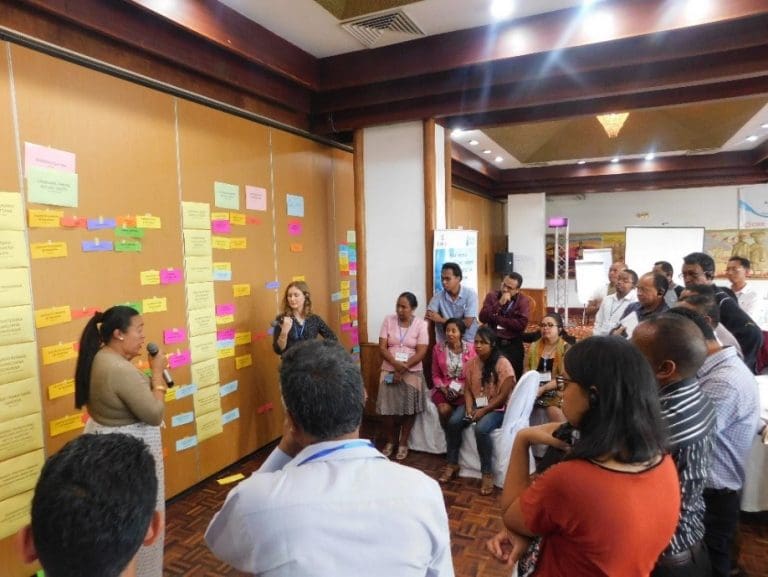
Workshop participants discuss the roles and responsibilities of those involved in the operation, maintenance, and management of water and sanitation services and identify essential functions that are not being performed using WaterAid’s ‘WhoDoesWATer’ game (CARE Madagascar).
Background: In June 2017, USAID launched a five-year, $30 million project called Rural Access to New Opportunities in Water, Sanitation, and Hygiene (RANO WASH) which aims to increase access to WASH services in rural areas of Madagascar. Agenda for Change member CARE is leading the RANO WASH consortium (which includes Catholic Relief Services, WaterAid, and two Malagasy private sector actors BushProof and Sandandrano) and has been working to strengthen WASH systems for over 25 years in Madagascar; they were also recently awarded CARE’s 2020 WASH Systems Change Award. This is a summary from a recent interview with the RANO WASH leads.
Alec Shannon (AS), Content Strategist, Agenda for Change: Tell me about the aims of the RANO WASH project – what parts of the WASH system are you working to strengthen?
Avo Ratoarijaona (AR), Deputy Chief of Party, RANO WASH: The aim of the project is to increase access to WASH services in Madagascar by strengthening governance, increasing engagement of the private sector, and influencing behavior change to increase adoption of WASH services. We are working in 250 communes across six regions.
AS: Can you speak a little bit more about how the consortium partners work together? What are their roles versus what is CARE’s role in the project?
Sebastien Fesneau (SF), Chief of Party, RANO WASH: WaterAid is leading on the governance component, building on their expertise and experience with government engagement and advocacy. CRS is leading on private sector engagement and is building the enabling environment for business[1]. CARE leads on the behavior change and gender mainstreaming components. BushProof and Sandandrano provide strategic technical advice, support and conduct technical surveys and project management of construction activities, and advise on the public-private partnership aspects.
AS: Tell me a bit about the history of WASH services in Madagascar. What has changed?
AR & SF: Around 25 years ago, community actors worked directly with local authorities to manage their water services. There was a period of 10 years with 10 different ministers of WASH, during which the sector saw a major decline – the WASH sector had been significantly de-prioritized and there was little investment. About 10 years ago, there were some changes to the involvement of the communities in water service management, since we found that more than 70% of the water infrastructure was not functional due to lack of management and capacity.
SF: The community-based approach to water management is no longer allowed by law in Madagascar, rather you must have either a government-managed water system or project engagement through this public-private partnership model. What you find in practice is a hybrid situation where you still have some cooperatives or associations that are managing water points in certain areas.
AR: Some of those governance issues are changing for the better now. For instance, the newly appointed ministry is composed of people who are from the WASH sector. The willingness of the private sector in Madagascar here is really a surprise for everyone. We now have about 60 enterprises expressing their interest to invest in WASH services. Other private actors, including banks and financial institutions, are expressing interest to reinforce the WASH sector.
AS: How would you advise those wishing to start the WASH systems strengthening process? Are there tools that you have found useful for explaining WASH systems concepts?
SF: Identify and recruit staff who have the systems mindset already and let them acquire additional skills along the way. Also, invest in continuous learning around systems strengthening like with the WASH Systems Academy by IRC[2] which provides an excellent introduction to systems terms and helps demystify concepts that can be hard to grasp.
WaterAid helped to organize and facilitated a workshop at the national level where they introduced the building blocks and helped reframe the conversation around a systems approach. The exercise helps stakeholders to identify gaps within the existing governance structure in Madagascar to ensure we take an inclusive approach for WASH services. We are planning a similar workshop at the regional level to continue to build upon the national workshop.
[1] CRS and WaterAid are also members of Agenda for Change.
[2] IRC is also a member of Agenda for Change.
—
Avo Ratoarijaona is Deputy Chief of Party for the RANO WASH project. A social worker by profession, she has 17 years’ experience managing and implementing complex urban and rural development projects in southern and eastern Madagascar and urban Antananarivo. Before this current position, Avo was the Institutional Strengthening Specialist of CARE Madagascar and from 2010 to 2013, Avo was the Community Health and Environment Coordinator of the RANO HP project, funded by USAID, working in 26 Communes in the southern and eastern parts of Madagascar.
Sébastien Fesneau is Chief of Party for the RANO WASH project and has over 20 years of experience in humanitarian work and complex programming in Europe, Asia & Pacific, Africa, and the Middle East. He has been with CARE for 5 years.
